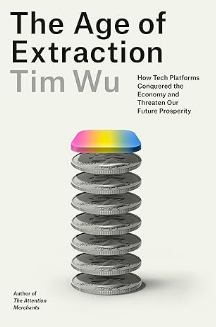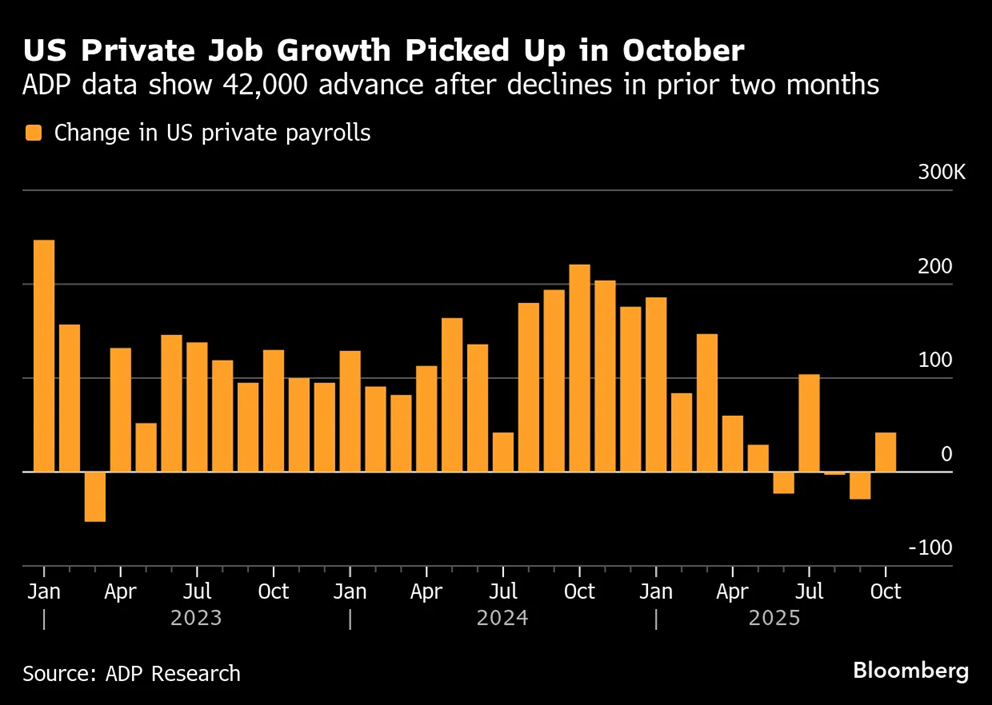 US Consumer Sentiment Index falls in November, approaching record low, according to the University of Michigan’s monthly survey. “This month’s decline in sentiment was widespread throughout the population, seen across age, income, and political affiliation,” said a spokesperson for the report. “With the federal government shutdown dragging on for over a month, consumers are now expressing worries about potential negative consequences for the economy.”
US Consumer Sentiment Index falls in November, approaching record low, according to the University of Michigan’s monthly survey. “This month’s decline in sentiment was widespread throughout the population, seen across age, income, and political affiliation,” said a spokesperson for the report. “With the federal government shutdown dragging on for over a month, consumers are now expressing worries about potential negative consequences for the economy.”
Book Bits: 8 November 2025
 ● The Age of Extraction: How Tech Platforms Conquered the Economy and Threaten Our Future Prosperity
● The Age of Extraction: How Tech Platforms Conquered the Economy and Threaten Our Future Prosperity
Tim Wu
Review via Financial Times
Tim Wu is a titan in the world of competition policy in digital markets. He is a distinguished legal scholar who coined the term net neutrality; the author of two significant books, The Master Switch (2010) and The Attention Merchants (2016), about the accumulation of market power by big tech companies; and was president Joe Biden’s special assistant for technology and competition policy as the administration began to attack the power of the digital giants.
This record of insight, indeed prescience, makes his new book, The Age of Extraction, a must-read. The subtitle says it all — How Tech Platforms Conquered the Economy and Threaten Our Future Prosperity. The analysis of economic dominance is unchanged from his previous books, but the tone now is both urgent and pessimistic.
50 Shades Of Tactical
There’s no consensus on what defines “tactical” for asset allocation, but I know it when I see it. But on Wall Street and beyond the details vary widely, enough so that two investors chatting about the topic can be referring to radically different ideas. Cue up an invitation to lay down some thoughts on the basic assumptions a tactical asset allocation strategy.
Macro Briefing: 7 November 2025
US layoffs surged in October, rising to the highest level in more than 20 years, according to data from Challenger, Gray & Christmas. “October’s pace of job cutting was much higher than average for the month,” said chief revenue officer for the data firm. “Some industries are correcting after the hiring boom of the pandemic, but this comes as AI adoption, softening consumer and corporate spending, and rising costs drive belt-tightening and hiring freezes.”
US Economy Probably Cooled In Q3, But Still Growing
It’s unclear when the government will publish the third-quarter GDP report, but the latest numbers still suggest that moderate growth prevailed.
Macro Briefing: 6 November 2025
Hiring at US companies rebounded in October: private sector employment increased by 42,000 jobs, according to the ADP Employment Report. “Private employers added jobs in October for the first time since July, but hiring was modest relative to what we reported earlier this year,” said Dr. Nela Richardson, chief economist, ADP. “Meanwhile, pay growth has been largely flat for more than a year, indicating that shifts in supply and demand are balanced.”
Is Bubble Risk Elevated?
Bubble talk is back and for obvious reasons. The stock market has been on a tear and valuation has soared. Classic signs of a bubble, right? Maybe, but it’s usually best to proceed cautiously before declaring that the end is near simply someone tells you the jig is up.
Macro Briefing: 5 November 2025
Democrats score key electoral wins, including the race for New York City’s mayor, and gubernatorial elections in New Jersey and Virginia. Democrats took advantage of party-out-of-power tailwinds to also pass new congressional district boundaries in California to boost the party’s electoral odds in the House in 2026. The results of last night’s elections exceeded polling expectations in the New Jersey and Virigina.
Total Return Forecasts: Major Asset Classes | 04 November 2025
The Global Market Index (GMI) remains on track to generate a 7%-plus annualized total return for the long-run outlook, based on data through October. This estimate of future performance has been steady in recent months, remaining unchanged from the previous month, for instance.
Macro Briefing: 4 November 2025
Manufacturing activity contracted for an eighth straight month in October, according to the survey-based ISM Manufacturing Index. Meanwhile, prices paid in the sector continue to rise. By contrast, a competing survey, paints a brighter picture, reporting “steady growth” in October via the US PMI Manufacturing Index.



